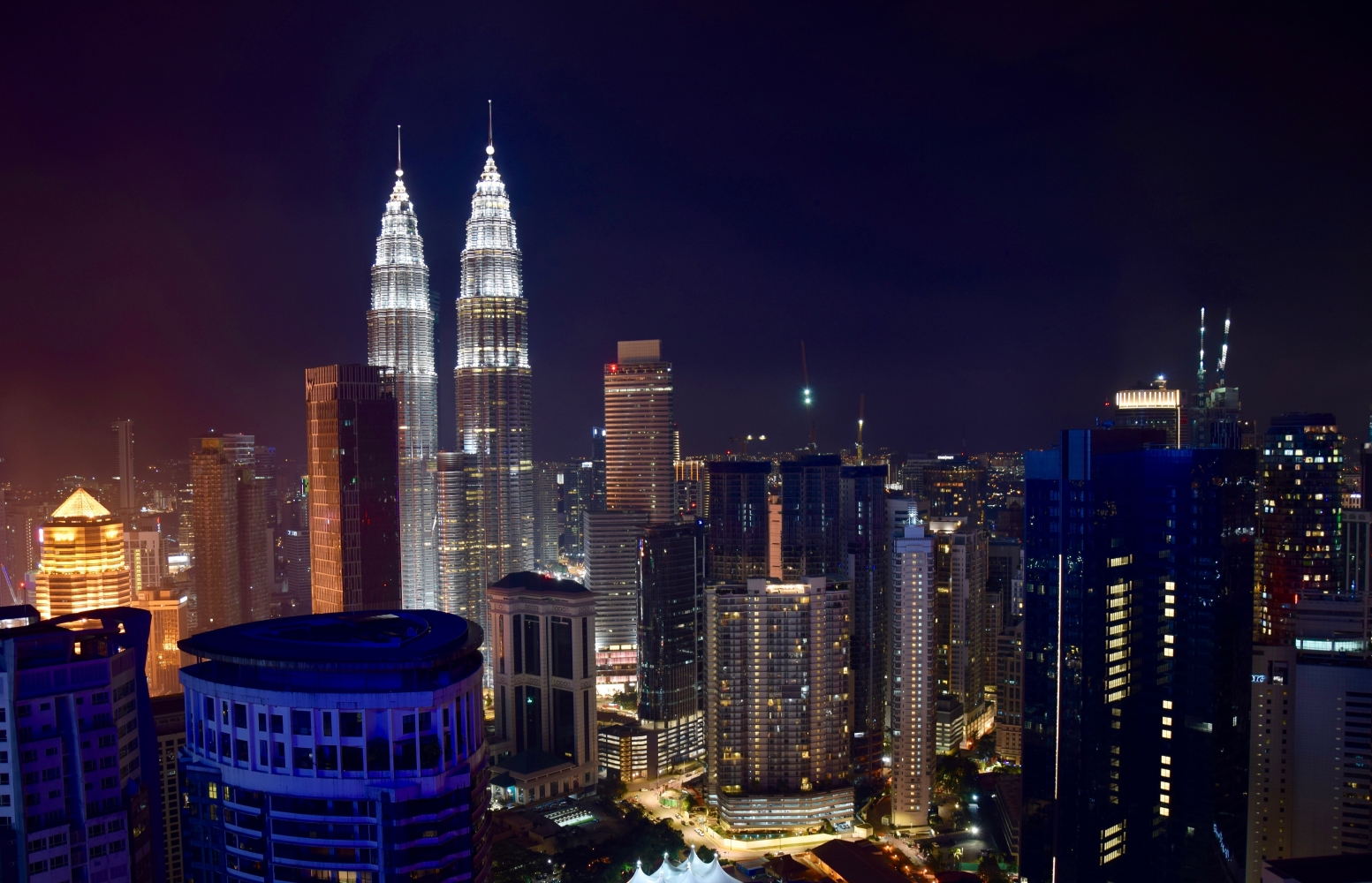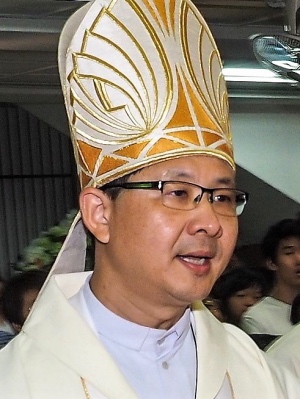
MATT K GEORGE, of World Watch Monitor, reports on how the church in Malaysia is speaking out ahead of the 9th May poll…
For the first time in six decades, the church in Malaysia has emphatically come out in support for a change of government.
On 24th April the Catholic Bishops’ Conference of Malaysia issued a pastoral letter urging Christians to “make your vote count for the common good of our nation”. Some evangelical ministers are making similar statements.
“We need to choose leaders who truly care for the rakyat [people], promote justice and equality, stand up for principles with integrity and work for the common good of citizens and strive to build a cohesive, harmonious and prosperous nation,” said the letter, signed by Most Rev Julian Leow, the Archbishop of Kuala Lumpur.

“Choose leaders who truly care for the people” – Archbishop of Kuala Lumpur Julian Leow. PICTURE: Flickr/CC/John Ragai.
“We need to choose leaders who truly care for the rakyat [people], promote justice and equality, stand up for principles with integrity and work for the common good of citizens and strive to build a cohesive, harmonious and prosperous nation.”
– Julian Leow, the Catholic Archbishop of Kuala Lumpur, in a pastoral letter.
The country goes to the polls on 9th May. Campaign rallies have begun in earnest.
The Islamic party PAS, previously aligned with the opposition, has now joined the ruling National Front coalition led by the United Malays National Organisation, or UMNO.
The National Front has ruled the country since Independence in 1957. UMNO, the mainstay of the coalition, has lost traction among urban Malay-Muslims.
Prime Minister and UMNO leader Najib Abdul Razak faces allegations of corruption. American authorities claim more than $US4 billion was misappropriated and at least $US700 million found its way into his personal account.
The allegations have seriously eroded support for UMNO and persuaded its former leader, Premier Mahathir Mohamad, to return to politics at the age of 92 to unseat UMNO from power.
To remain in power, UMNO and Najib have allied with PAS, once its great rival for the Malay-Muslim vote in the rural heartland. The aim is to win support from PAS voters in return for enacting Sharia-compliant policies.
In return, PAS wants UMNO to continue its decades-long ambition to turn the multi-ethnic, multi-religious country of 32 million people into an Islamic state.
PAS seeks to elevate Sharia (Islamic law) to the equal or superior of civil courts, and impose harsh hudud punishments, which under Islam are considered to be mandated by God. Last year PAS persuaded government authorities to ban beer festivals in the capital Kuala Lumpur, as alcohol is widely considered forbidden under Islam.
Arrayed against the PAS-UMNO combination is a cluster of opposition parties in the Alliance of Hope, or Pakatan Harapan. The coalition comprises Mahathir’s new party of former UMNO members that has been refused permission to campaign under its own banner and symbol; the mainly Chinese-dominated Democratic Action Party; the People’s Justice Party led by the wife of the former Deputy Prime Minister Anwar Ibrahim; and other minor players.
Anwar Ibrahim has been in jail since 2015, when a sodomy conviction against him was upheld. Human rights groups and international jurists called his conviction politically motivated.

Skyline of Kuala Lumpur, capital of Malaysia. PICTURE: Levente Balogh/Unsplash
Religion is always near the surface of Malaysian politics. The constitution defines ethnic Malays as Muslims, leaving Malays with no choice but to identify as Muslim. Conversion to Christianity is against the law in almost all states, as is evangelism among Malay Muslims. The right of Christians to use the word “Allah” in reference to God is a question being debated in the courts.
Stepping into the fray, the church has taken stands against restrictions on press freedom – including a ban on so-called “fake news” – and UMNO’s lack of transparency. Earlier in April, Right Rev Bernard Paul, bishop of the Diocese of Malacca and Johor, Malaysia’s two southerly states, distributed circulars to his flock urging them to pray for God’s intervention and for change in “our beloved country”.
“Some call this the Second Independence Movement of the nation,” Bishop Paul’s circular read. “Once we freed ourselves from the colonial rule; now we are labouring to free ourselves from oppressive, demoralising ‘deadwoods’, who lie to themselves, that they ‘mendahulukan rakyat’ [put the people first].”
“There is no clean government, nor governance; no clean elections; no clean institutions; no clean law enforcement; no clean management of finance and resources; no clean, reputable leaders,” Bishop Paul said, adding a call for thousands of Malaysians to serve as poll watchers during the upcoming election.
The appeal has had an effect, said KJ John, chairman of the Oriental Hearts and Minds Study Institute.
“This time the church is fully engaged and involved, especially as polling and counting agents.”
– KJ John, chairman of the Oriental Hearts and Minds Study Institute
“This time the church is fully engaged and involved, especially as polling and counting agents,” he said. “I went for one training programme and there were about 400 plus volunteers.”
The call for poll monitors went out on 22nd April from the pulpit of many churches.
“The government’s very well-planned and bulldozed gerrymandering exercise has tilted the balance massively in the ruling government’s favour, so that even the so-called opposition ‘safe seats’ with good majorities could be lost,” a preacher at an evangelical church said.
The preacher, who asked not to be named, urged Christians to exercise their right to vote, and in a direct appeal for the opposition coalition, encouraged a vote for the Alliance of Hope.
“Until then, do fast, pray and spread the word,” he said. “Get every eligible voter to check and go out to vote for the change that we all need…a better Malaysia with a future for all. God bless Malaysia.”
The evangelical Tower of Incense Church has committed to pray every Tuesday-Friday, from noon until 6pm, until the 9th May election. It has committed to be part of Prayer United Malaysia’s 72 Hours Prayer Chain, headed by Pastor Teo Kwee Keng, a popular speaker.
It’s rare for the church to level explicit criticism at the government, and it has been noticed. Bishop Paul has come under attack for suggesting that the government is corrupt and oppressive. The leader of PAS, Abdul Hadi Awang, accused Bishop Paul of spreading “falsehood and evil”. He said the bishop’s “deadwoods” remark is an attempt to “side-line Islam from the Federal Constitution and belittle the rulers who are the head of religion and were likened to deadwood”.
Hadi also claimed the Church protected the British colonial legacy and secular parties such as the Democratic Action Party, and accused the latter of wanting to “lower the position of Islam and weaken the institution of the constitutional monarchy”.
He said if Christian priests wanted to be involved in politics they should run in the elections. “If the PAS ulama [clergy] in their robes and turban can enter the electoral field to become candidates, then I challenge [Christians] to also jump into the political field with their chosen party without the need to take off their priest robes,” he said.
Acting on a complaint, police are investigating whether the bishop’s actions amount to sedition for urging Christians to save the country from “oppressive rule”. Malay political analyst Dr Kamarul Zaman Yusoff used social media to accuse the church of being “overtly political”.
Still, Malaysians of all creed and colour in recent years have marched in the streets of Kuala Lumpur to demand good governance and fair elections under the banner of Bersih, or ‘Clean’. Some of the protest marches turned violent as pro-government supporters staged rival rallies and police fired tear gas and water cannons at marchers. Christian leaders had attended the street protests and several churches in Kuala Lumpur opened their doors as places of refuge to the rallygoers.
The Malaysian diaspora has held its own Bersih rallies in 41 cities around the world, from Australia to the United States. In March, the Council of Churches Malaysia organised a Pilgrimage towards Justice and Peace solidarity event to address the concerns of Malaysian Christians at a time of increasing political tension and polarisation of the races.





